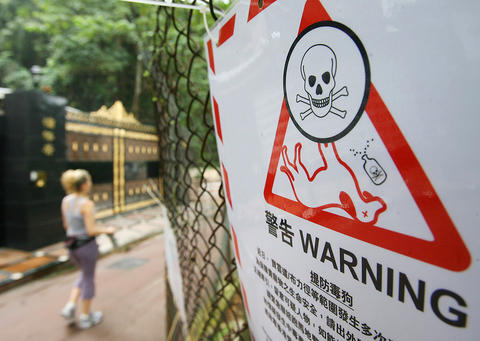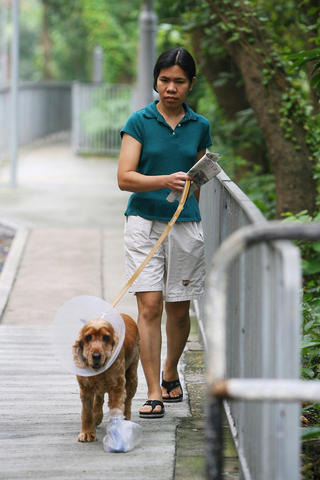For nearly two decades, a serial killer has terrorized one of Hong Kong's most affluent residential areas. Motive and identity remaining a mystery.
The infamous "Bowen Road Poisoner" has claimed dozens of lives, his - or her - most recent victim dying just last month after eating meat laced with a lethal dose of insecticide.
Lethal, that is, to the pet dogs who are the target of this elusive killer.

PHOTO: AFP
The poisoner's name derives from a tree-lined street popular with dog-walkers where many of the victims have died.
And the killer's modus operandi - laying down poisoned meat at the side of the road where dogs are likely to find it - has allowed whoever it is to go undetected since 1989.
The latest victim, a chocolate-brown mongrel adopted from Hong Kong's dog rescuers, died last month within 30 minutes of eating poisoned meat as her owners took her for an early morning walk on Bowen Road.

PHOTO: AFP
Police figures show there have been 72 reported poisonings in the area since 1989, 44 of them fatal, although vets here believe many more such incidents might have gone unreported.
Earlier this year, one Hong Kong dog lover decided enough was enough.
Local resident and dog owner Barry Lea pledged US$6,500 of his own money to allow Hong Kong's Society for the Prevention of Cruelty to Animals (SPCA) to double its long-standing reward for information leading to the poisoner's arrest.
Lea, a former police officer, said he was inspired to act after the deaths of two Labrador-poodle crosses being trained to work as care dogs.
"I'm a dog lover and I have a Labrador retriever who's a trained search and rescue dog. Why anyone would want to see her dying an agonizing death is beyond me," he says.
"(The case) is in the hands of regional crime units, who usually deal with serious crime. But so far, they've not been able to track the culprit down, and it will be money well spent if they do."
The pledge has injected new life into the SPCA's campaign to raise awareness of the poisonings among dog owners.
The organization says it has switched the focus of its campaign to public education as the poisoner continues to evade police.
SPCA Chief Superintendent Tony Ho, a retired police officer, leads a team of people who regularly patrol Bowen Road, and nearby Black's Link, handing out leaflets and talking to walkers.
"We are trying to educate the dog owners to control their dogs and by telling them what they should do if they suspect the dog may have consumed poison," he says.
"But we also talk to the other road users. We try to explain to them that if they're not happy about the animals they shouldn't put the blame on the animals, it's the owners' fault."
Ho says the patrols have uncovered high levels of anti-dog sentiment in this traditionally pet-loving city.
He believes there may be some ill-feeling, particularly among older people, about dogs fouling the street near sacred spots such as Lover's Rock, where unmarried women go to pray for a husband, in this deeply superstitious city.
"You do get copycat crimes and it's very difficult to say whether it's one person doing this, or more.
"All we can do is do our very best and continue to send our men up more than once a day, and the police are doing almost the same. Trouble is we can't do it for 24 hours, it's a very long stretch of road," Ho says.
Lea believes the poisoner has been "either very clever or very lucky, or a combination of both" to be able to evade detection for so long, while continuing to lay down bait on the popular street.
"The area spreads over several kilometers and while it's a well trod path there are lots of twists and turns and there are times when it's pretty quiet," he says.
There have been frequent complaints that Hong Kong police do not take the killings seriously enough, although the force has devoted considerable resources to the case, at one point drafting in a Swedish pet specialist to profile the serial killer.
Lea, a long-term Hong Kong resident, fears the poisonings are now beginning to harm the city's image.
"It's been going on for a very long time now, far too long, and a lot of animals have been killed or injured," he says.
"But it goes further than the killing of innocent creatures. The Australian Chamber of Commerce recently published an article on living in Hong Kong that included a warning about the dog poisoner.
"When you get that kind of thing it starts to reflect quite badly on the place as a whole."

On April 26, The Lancet published a letter from two doctors at Taichung-based China Medical University Hospital (CMUH) warning that “Taiwan’s Health Care System is on the Brink of Collapse.” The authors said that “Years of policy inaction and mismanagement of resources have led to the National Health Insurance system operating under unsustainable conditions.” The pushback was immediate. Errors in the paper were quickly identified and publicized, to discredit the authors (the hospital apologized). CNA reported that CMUH said the letter described Taiwan in 2021 as having 62 nurses per 10,000 people, when the correct number was 78 nurses per 10,000

As we live longer, our risk of cognitive impairment is increasing. How can we delay the onset of symptoms? Do we have to give up every indulgence or can small changes make a difference? We asked neurologists for tips on how to keep our brains healthy for life. TAKE CARE OF YOUR HEALTH “All of the sensible things that apply to bodily health apply to brain health,” says Suzanne O’Sullivan, a consultant in neurology at the National Hospital for Neurology and Neurosurgery in London, and the author of The Age of Diagnosis. “When you’re 20, you can get away with absolute

May 5 to May 11 What started out as friction between Taiwanese students at Taichung First High School and a Japanese head cook escalated dramatically over the first two weeks of May 1927. It began on April 30 when the cook’s wife knew that lotus starch used in that night’s dinner had rat feces in it, but failed to inform staff until the meal was already prepared. The students believed that her silence was intentional, and filed a complaint. The school’s Japanese administrators sided with the cook’s family, dismissing the students as troublemakers and clamping down on their freedoms — with

As Donald Trump’s executive order in March led to the shuttering of Voice of America (VOA) — the global broadcaster whose roots date back to the fight against Nazi propaganda — he quickly attracted support from figures not used to aligning themselves with any US administration. Trump had ordered the US Agency for Global Media, the federal agency that funds VOA and other groups promoting independent journalism overseas, to be “eliminated to the maximum extent consistent with applicable law.” The decision suddenly halted programming in 49 languages to more than 425 million people. In Moscow, Margarita Simonyan, the hardline editor-in-chief of the